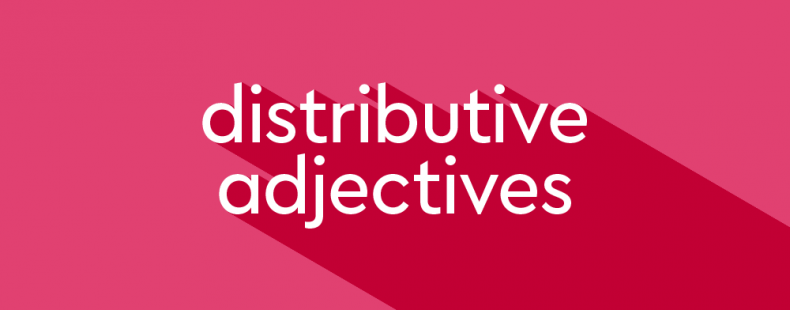It is a good idea to brush your teeth every day. It is good manners to be nice to each person you meet. When it comes to lions and tigers, you shouldn’t try to hug either one. Not only are these three sentences examples of good advice (especially the one about cuddling dangerous cats), but they all are examples of sentences that use adjectives. Adjectives are words that we use to modify nouns and pronouns, and there are many different types of adjectives with different functions. As it happens, our three sentences crammed full of wisdom all use adjectives that consider members of a group as individuals. This type of adjective is known as a distributive adjective.
What is a distributive adjective?
A distributive adjective is an adjective that refers to members of a group individually. For example, the word each is a distributive adjective in the sentence Each person got their own lunch. The word every is a distributive adjective in the sentence He gave a bone to every dog at the park. While these sentences mean that something is happening to an entire group, the distributive adjectives separate the groups into individual members. We are talking about what happens to the members of a group.
Often, distributive adjectives are used to slightly alter a sentence’s meaning. For example,
- Every child received a toy.
- The children received toys.
While these two sentences are close in meaning, the first sentence says that every single child got a toy while the second says that a bunch of toys were given to a group of children. The second sentence doesn’t specify how the toys were distributed, and it could mean that the children received toys as a group to be shared, for example. Distributive adjectives are helpful when trying to express specific meanings in situations like this.
List of distributive adjectives
Some of the most commonly used distributive adjectives include:
Where do you include a distributive adjective in a sentence?
Most of the time, distributive adjectives are used before the nouns and pronouns they modify:
- Every house on the street has a chimney.
- Either option sounds good to me.
- Any person can make a donation.
Distributive adjective examples in a sentence
The following examples show how we use distributive adjectives in sentences.
Each and every
Both the words each and every are used to refer to individual members of a larger group.
- Each person got a turn to ride the pony.
- Jessica gave each girl a piece of candy.
- Every person at the masquerade wore a mask.
- I run a mile every day.
Sometimes, the two words are even used together in informal writing:
- The comedian made each and every member of the audience laugh.
Either, neither, and both
The words either, neither, and both are used to refer to situations in which there are two options.
- Either path will get us out of the woods.
- There could be a hairy spider in either box.
- Neither man knew how to fly a plane.
- Neither answer sounded right.
- Both cats chased the mouse.
- He carried the bucket using both hands.
Any
The word any can refer to one member or every member of a group.
- Any member of the club can come to the party.
- I can outrun any person here.
Distributive adjective rules & best practices
Besides both, demonstrative adjectives are typically used with singular nouns. For example, we would say Each door has a number on it and not Each doors have a number on them. As another example, we say The squirrel was in neither tree and not The squirrel was in neither trees.
The words each, either, neither, any, and both can all be used as pronouns. If they are, they may not follow the rules of adjectives and might be used alone in a sentence:
- Adjective: Each player scored a goal.
- Pronoun: Each of the players scored a goal.
- Adjective: She chose neither option.
- Pronoun: Of the two options, she chose neither.
Make the most of each word you write
Confused about distributive adjectives and their proper use? Let Thesaurus.com Grammar Coach™ guide you! This writing platform uses machine learning technology uniquely designed to catch grammar as well as spelling errors. Plus, Grammar Coach™ Synonym Swap will find the best nouns, adjectives, and more to help say what you really mean, guiding you toward clearer, stronger, writing.















